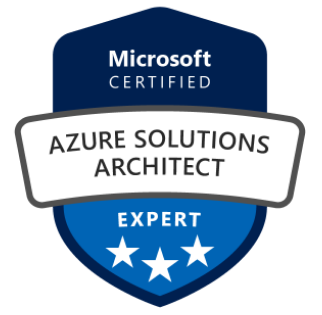Microsoft Azure Architect Technologies
Candidates for this exam should have advanced experience and knowledge of IT operations, including networking, virtualization, identity, security, business continuity, disaster recovery, data platforms, and governance. A professional in this role should manage how decisions in each area affect an overall solution. In addition, they should have experience in Azure administration, Azure development, and DevOps processes.
Course Outline
Implement cloud infrastructure monitoring
- monitor security
- monitor performance
- monitor health and availability
- monitor cost
- configure advanced logging
- initiate automated responses by using Action Groups
- configure and manage advanced alerts
Implement storage accounts
- select storage account options based on a use case
- configure Azure Files and Azure Blob storage
- configure network access to the storage account
- implement Shared Access Signatures and access policies
- implement Azure AD authentication for storage
- manage access keys
- implement Azure storage replication
- implement Azure storage account failover
Implement VMs for Windows and Linux
- configure high availability
- configure storage for VMs
- select virtual machine size
- implement Azure Dedicated Hosts
- deploy and configure Virtual Machine Scale Sets
- configure Azure Disk Encryption
Automate deployment and configuration of resources
- save a deployment as an Azure Resource Manager template
- modify Azure Resource Manager template (JSON and Bicep)
- evaluate location of new resources
- configure a VHD image
- deploy from an image
- manage an image library
- create and execute an Azure Automation runbook
Implement virtual networking
- implement VNet to VNet connections
- implement VNet peering
Implement Azure Active Directory
- add custom domains
- configure Azure AD Identity Protection
- implement self-service password reset
- implement Conditional Access including MFA
- configure fraud alerts
- configure verification methods
- implement and manage guest accounts
- manage multiple directories
Implement and manage hybrid identities
- install and configure Azure AD Connect
- identity synchronization options
- configure and manage password sync and password writeback
- configure single sign-on
- configure Azure AD Connect cloud sync
- use Azure AD Connect Health
Manage workloads in Azure
- migrate workloads using Azure Migrate
- implement Azure Backup for Azure workloads
- implement disaster recovery
- implement Azure Automation Update Management
Implement load balancing and network security
- implement Azure Load Balancer
- implement an Azure Application Gateway
- implement Web Application Firewall
- implement Azure Firewall
- implement Azure Firewall Manager
- implement Azure Front Door
- implement Azure Traffic Manager
- implement Network Security Groups and Application Security Groups
- implement Bastion
Implement and manage Azure governance solutions
- create and manage hierarchical structure that contains management groups, subscriptions and resource groups
- assign RBAC roles
- create a custom RBAC role
- configure access to Azure resources by assigning roles
- configure management access to Azure
- interpret effective permissions
- set up and perform an access review
- implement and configure Azure Policy
- implement and configure Azure Blueprints
Manage security for applications
- implement and configure Key Vault
- implement and configure Managed Identities
- register and manage applications in Azure AD
Implement an application infrastructure
- create and configure Azure App Service
- create an App Service Web App for Containers
- create and configure an App Service plan
- configure App Service
- configure networking for App Service
- create and manage deployment slots
- implement Logic Apps
- implement Azure Functions
Implement container-based applications
- create a container image
- configure Azure Kubernetes Service
- push container images
- deploy a solution on an Azure Container Instance
Implement NoSQL databases
- configure Azure Storage tables
- select appropriate Cosmos DB APIs
- set up replicas in Cosmos DB
Implement Azure SQL databases
- configure Azure SQL database settings
- implement Azure SQL managed instances
- configure HA for an Azure SQL database
- deploy an Azure SQL database
Popular Architect Courses
Azure Solution Architects have subject matter expertise in designing cloud and hybrid solutions that run on Microsoft Azure, including compute, network, storage, monitor, and security.


